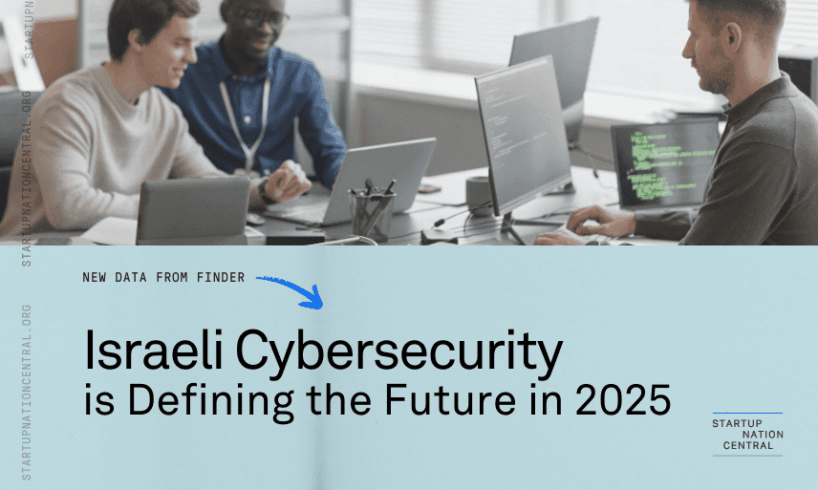
July 2025
Cybersecurity has become a defining issue for governments, enterprises, and infrastructure providers worldwide. As digital systems grow more complex and AI capabilities accelerate, the stakes grow ever higher. In this environment, the Israeli cybersecurity sector stands out for its ability to build, scale, and lead.
Even in a year marked by macroeconomic contraction and regional instability, Israeli cyber companies continued to attract capital, talent, and partnerships at scale. The sector’s strategic focus, early validation mechanisms, and technical depth have positioned it as a trusted partner in addressing the most urgent security challenges of our time.
The Numbers Behind Israel’s Cyber Dominance
In 2024, Israeli cybersecurity companies raised private funding equal to 40% of the total U.S. market. According to 2024 data from Finder, investment volumes nearly doubled from 2023.
Cyber companies make up only 7% of the Israeli tech ecosystem by number, yet they commanded 36% of total tech investment in 2024, raising $3.8 billion. These firms continue to outperform their peers in scale, talent density, and strategic maturity, securing median funding round sizes more than double the average across Israel’s tech ecosystem.
Acquisition remains the dominant exit strategy. While only 1% of cybersecurity companies go public, 11% have been acquired, a rate significantly above the broader tech average. This reflects a sector built to solve acute problems and deliver impact early.
Why Israeli Cybersecurity Startups Scale Faster
Several forces drive the strength of Israel’s cybersecurity sector. First is talent. Many cyber founders are veterans of elite military units like Unit 8200, where they developed real-world skills in threat detection, data analysis, and infrastructure defense. This experience creates strong alignment between technical capabilities and practical application.
Second is Israel’s global-first mindset. Local market size is limited, which means companies are designed from the outset to serve global enterprises. Startups are pushed to meet the standards of Fortune 500 CISOs and scale across regions, not just verticals.
Third is capital model evolution. In recent years, Israeli founders have adopted a more U.S.-style approach to growth, raising larger rounds earlier and investing in product depth. This shift has enabled companies to compete head-on with global players and prioritize best-in-class delivery.
The result: 16% of Israeli cyber companies are already in growth stage, compared to just 7% in the broader tech ecosystem. Nearly one-third employ more than 50 people, well above the national startup average.
Cybersecurity Trends Shaping 2025 and How Israel Leads
The global cybersecurity market is shifting toward active defense. Organizations are implementing Zero Trust architectures, outsourcing MDR services, and securing complex supply chains. At the same time, threat actors are evolving. Ransomware is no longer limited to encryption. Data theft and extortion tactics are expanding, with leaks now as damaging as downtime.
AI is playing both sides: attackers use generative tools to automate malware, mimic user behavior, and develop rogue agents while defenders respond with AI-enhanced monitoring, autonomous detection, and dynamic response protocols. Israeli companies are leading development on both fronts.
Geopolitics is further amplifying the cyber stakes. Nation-state actors continue to use digital operations to achieve strategic goals, from infrastructure disruption to influence campaigns. Regulatory pressure is rising in parallel, pushing enterprises to adopt stronger controls and mandatory compliance frameworks.
Across these developments, Israeli firms are building trusted, adaptable solutions that anticipate where the market is going.
AI Security is Israel’s Emerging Advantage
AI security is not a future concern, it is a current market. Israeli startups are advancing on two fronts by integrating AI into cybersecurity platforms and developing dedicated tools to secure AI systems themselves.
Startups like Zenity, Noma Security, Prompt Security, and Pillar Security are building tools that manage identity, permissions, and misuse risks associated with GenAI systems. Others, like Twine Security, are targeting the broader attack surface created by autonomous agents and no-code platforms.
With agentic AI increasingly embedded into enterprise workflows, the need for robust governance, security layers, and threat prevention tools is growing fast. Israeli companies are already delivering real-time validation and securing global pilots across sectors.
Exit-Driven, Not Exit-Limited: Israel’s Cyber M&A Culture
The Israeli cybersecurity market is structurally built for acquisition. Rather than seeing M&A as a fallback, the sector treats it as a core scaling mechanism. This aligns with global buyer demand for sharp, differentiated capabilities that fill portfolio gaps or extend platform coverage.
Over the past six years, cyber M&A activity has accounted for a large portion of Israeli exits. In 2025, Google’s $32 billion acquisition of Wiz set a new benchmark, the largest acquisition in Israel’s history, and Google’s largest ever. Other notable deals included Talon ($625M), Dig Security ($350M), and Avalor ($350M).
The strength of this trend reflects confidence not only in the technology but in the teams and their ability to integrate with larger infrastructures.
The Global Playbook Makes Israel a Cybersecurity Powerhouse
The resilience of Israel’s cybersecurity sector stems from its design. Early-stage startups are tightly connected to global CISOs, partners, and validation networks. Organizations like Cyber Together facilitate direct engagement, fast feedback, and real-world use case alignment.
Founders are focused, often choosing narrow but technically demanding problems. This specialization, coupled with deep domain expertise and an agile, bold approach to innovation, allows them to outmaneuver larger but slower-moving competitors.
Investor confidence remains high despite geopolitical complexity. In fact, Israeli companies are often seen as more battle-tested both technically and operationally. Strategic funding flows from both global VCs and multinationals seeking proximity to next-generation tech.
Explore the Israeli Cybersecurity Landscape
Across cloud security, data privacy, endpoint protection, identity management, and more, Israeli startups are delivering world-class solutions. The Cybersecurity Landscape Map 2025 highlights key companies in every major domain, including:
Cloud: Wiz, Orca Security, Aqua
Identity: CyberArk, Transmit, Forter
GRC & Vulnerability: Pentera, CyCognito
Security Ops: Hunters, torq, CYE
Data Security: Cyera, BigID, Deep Instinct
This ecosystem continues to grow and evolve, shaped by a culture of speed, rigor, and technical excellence.
Access a complete list of Israeli Cybersecurity companies on Finder
Cybersecurity’s Next Era Will Be Built in Israel
Israel’s cybersecurity sector is not immune to global pressures. But its ability to outperform amid adversity speaks to its structural strengths. Funding remains steady. M&A interest is strong. Technical leadership continues to expand in both traditional and emerging domains.
As AI reshapes security architecture and cyber threats grow more sophisticated, Israel is already solving for what comes next. The sector’s mindset, infrastructure, and global orientation make it a critical player in defining the future of digital defense.
Explore the Cybersecurity Landscape Map 2025





